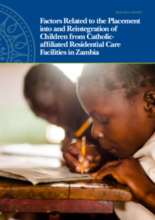This is a study from Catholic Relief Services that investigates the factors related to children’s placement in Catholic-affiliated residential care facilities in Zambia. According to this study, the government estimates that there are approximately 190 residential-care facilities located in Zambia, and of those 40 are Catholic-affiliated. At the time of this study, there were 1674 residents living in residential care.
The study sought to answer three main research questions:
1) What characterizes Catholic-affiliated residential care for children?
2) What are the main factors that promote family preservation, family reintegration, alternative family-based care, adoption and residential care for vulnerable children?
3) What happens to children who leave the care of a Catholic affiliated-residential facility (care leavers)?
The study found that the top reasons for placing children in Catholic-affiliated residential care facilities were: 1) poverty (primarily resulting in the inability to afford school fees and/or food insecurity); 2) death of a parent; 3) disability or chronic illness of the child in care; 4) abuse, maltreatment, or neglect; 5) disability or chronic illness of a household member; and 6) caregivers’ inability to cope with rebellious behaviors displayed by children and youth.
The study also found that visitation is very important for child reintegration. When asked why residents leave care, facility directors reported that children leave for the following reasons: a) they were placed with family or kin who were persons other than their biological parents; b) aged out of the facility; c) the reunited with biological parents; d) they were placed in foster care or d) they passed away.
When asked about alternative care, most facilities reported attempts to place residents into alternative based care and provided data on the attempts. According to the study, facility directors emphasized the importance of kinship care, but issues of poverty makes finding kinship care a difficult thing to accomplish.
This study also discussed the experience of care leavers. The researchers interviewed 40 young people, which included 26 females and 14 male participants. The care leavers primarily reported that the decision to leave care was a mutual one, and care leavers stated that they were “greatly involved” in the decision making process. Care leavers reported they received assistance in their job searches. Many reported that they could have used assistance in obtaining education. Some felt welcomed by their communities. Main challenges included inability to meet basic needs and developing and maintaining personal relationships.
The findings of this study will be used in a participatory process by key stakeholders to design programming in order to reduce the number of children entering care.

